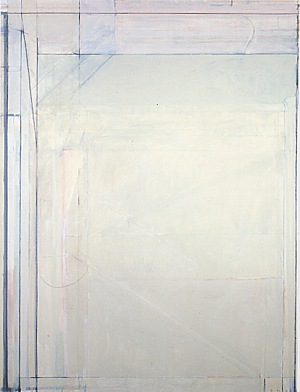|
KYSO Flash ™
Knock-Your-Socks-Off Art and Literature
|
|
|||
Richard Diebenkorn’s Ocean Park #109by Charles D. TarltonDerive happiness in oneself from a good day’s work, from illuminating the fog that surrounds us. I was going to say again it doesn’t “mean” anything. Here’s what I mean. The boy comes on in Godot to represent—what? Hope? Despair? Betrayal? The answer: Nothing, same old, same old. They wait and wait (and wait?) for Godot; meaning would have put an end on it, or, rather, had meaning been inserted it could have come to an end. Whatever the painter was originally intending here, the final version struggles only to become its own impenetrable blank unbesmirched canvas—“...you must go on, I can’t go on, I’ll go on.” [*] We can see down into this one, faintly, deeper and deeper. Paint, cover up, rub out, paint again, cover up, rub out, paint.... maybe nothing is the meaning. The paint being inert goes where you put it maybe meaning is like rain washing out a cistern speaking in silence writing in water on dry sand playing on synaptic vesicles in sleeping brains he winks defiantly The real difficulty here is this: every feature of this painting is exactly the sort of thing that indicates meaning! Deliberate lines drawn, crossing over, intersecting to make shapes, shadow-shapes, and wisps. There is a record here, of the painter’s passage, where he stood, where he bent and reached, whether he held a brush, a knife, a turpentine rag. And then he stopped. Are we supposed to go on then by ourselves, pick up the scent, and see it through? it leads nowhere giving us the clearest picture of what’s not-present what this picture is a picture of we feel it in a tingle it’s like all the paintings ever painted, layered on layers, each layer blurred to make way for the next one’s serial maculation In school I learned some of the formalities of Euclidean geometry, how the angle antagonizes rectilinear intentions, or when they are piled up in heaps then rearranged, you can build forms out of triangle, square, and trapezoid. And this: while parallel lines will never meet, in that same tautological world non-parallel lines meet only once, but more often in this pale palimpsest. a window opened and blinding sunlight flooded straight into your eye it drowned the possibility of sight or blindness a dingy canvas thrown over memories of stacked sticks like the skeletons of pup tents in rows at the hot sandy shore the underside of dazzle At a crucial juncture in the action of the work, just when the painter erred, he reached over with a large paintbrush (was this the initiating gesture? the place where he found traction?) and a coffee can of beige wash to cover his gaucheries so he could start again. When the muddy cover dried, the earlier mistakes still showed through, spidery and faint. But now so altered, still he loved them, searching in their smoky depths, listening to their whispered song. the point of this one is erasure (nothing’s left of any patterns but their faint pastel shadows) subterranean silhouettes the way a bad dream stabs at you, and you wake with the horror still real but in an hour has gone beneath a soothing pale oblivion s’effacer a spectator’s art is embodied, then effaced what is going on? the eyes of the aesthete fear they have arrived too late the spectators are late roaming now in muted ruins free to make their own art, dream down through tissued layers whatever they can find
* Publisher’s Notes:
More on the Web: By, About, and Beyond⚡ Saying Good-bye to Diebenkorn by John Seed in The Huffington Post (5 June 2012; updated 5 August 2012) |
|
Site contains text, proprietary computer code, |
|
| ⚡ Many thanks for taking time to report broken links to: KYSOWebmaster [at] gmail [dot] com ⚡ | |
